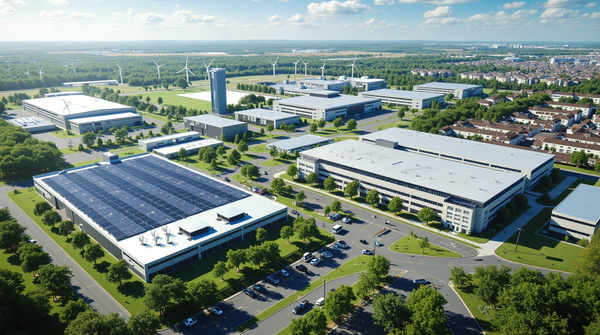"From Positive Energy to Environmental Excellence: How Business Parks Reinvent their Energy Mix".

In a world increasingly aware of the environmental impact of human activities, business parks are redefining their energy approach to achieve environmental excellence. The integration of renewable energies and sustainable practices has become essential for companies seeking to reduce their carbon footprint while maximizing energy efficiency.
The importance of positive energy
One of the key concepts adopted by many business parks is that of positive energy. This means producing more energy on site than is consumed. This can be achieved through a combination of renewable energy sources, namely solar, wind and geothermal. For example, the Val-de-Reuil business park in Normandy has invested in solar panels covering the roofs of its buildings, generating a significant amount of green electricity that powers not only their day-to-day operations but also local infrastructure.
Integrating intelligent technologies
Smart technologies also play a crucial role in reinventing the energy mix of business parks. By using advanced energy management systems, companies can monitor and optimize energy consumption in real time. These technologies can detect inefficiencies and propose immediate solutions, such as automatic adjustment of lighting and air conditioning according to occupancy levels. The Green Tech Valley business park in Grenoble has implemented a system of this type, reducing its energy consumption by 20% in just two years.
Collaboration for lasting impact
The success of these initiatives often depends on collaboration between companies, local governments and energy experts. Business parks can become models of innovation by creating partnerships that encourage the sharing of knowledge and resources. For example, the Sophia Antipolis business park has collaborated with local universities to develop energy storage technologies and improve the efficiency of existing energy systems.
Concrete examples of exemplary business parks
Some business parks stand out for their exceptional sustainability efforts. The La Défense business park in Paris has implemented a heat recovery system that uses waste heat from buildings to heat sanitary water. Similarly, the Lyon Confluence business park is a pioneer in the use of biomass to generate energy, significantly reducing CO2 emissions.
Challenges to overcome
While the benefits are many, the transition to a sustainable energy mix also presents challenges. The initial cost of renewable technologies and smart infrastructure can be a barrier for some companies. What's more, integrating new technologies often requires specialized training and adaptation of existing processes.
Towards a sustainable future
In conclusion, business parks that reinvent their energy mix are leading the way towards a more sustainable future. By adopting positive energy practices, integrating smart technologies and collaborating with different stakeholders, these parks not only reduce their environmental impact, but also create healthier, more productive environments for their employees. Successful transformation towards environmental excellence depends on collective commitment and continuous innovation to meet tomorrow's energy challenges.
Examples of European Parks Committed to Energy Transition
Innovative Industrial Parks
- Rotterdam Industrial Park (Netherlands): Aiming for carbon neutrality in 2030 thanks to an industrial heating network and green hydrogen
- GreenLab Skive (Denmark): symbiotic industrial park using 100% renewable energies and developing energy storage.
- Industriepark Höchst (Germany): Green hydrogen production and cogeneration system supplying over 90 companies
- Port of Antwerp (Belgium): CO2 capture and storage project, coupled with offshore wind farms
Sustainable Logistics Parks
- Chapelle International (France) First positive-energy urban logistics park, powered by geothermal energy and solar panels
- Green Logistics Park Bologna (Italy) 100% energy self-sufficiency thanks to a photovoltaic and biomass mix
- Stockholm Royal Seaport (Sweden): smart grid logistics zone integrating energy storage and electric vehicles
- LogistikPark Nürnberg (Germany): DGNB Platinum certification, using an innovative energy recovery system



